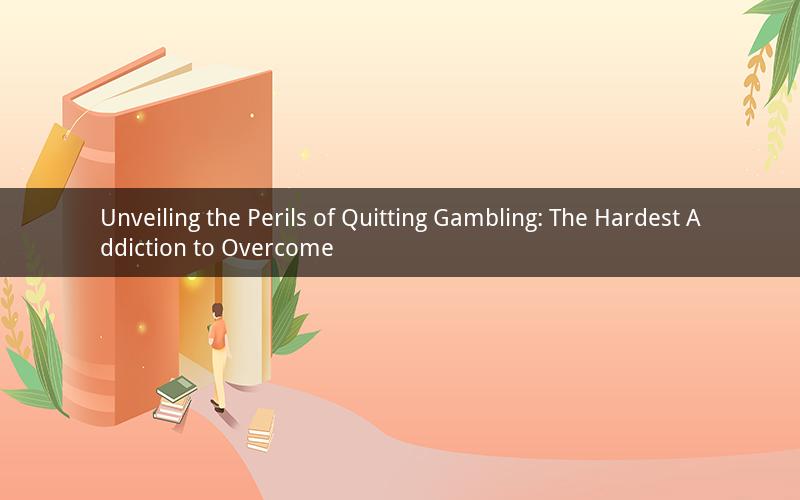
Introduction:
Gambling has long been recognized as a form of entertainment, but its addictive nature often leads individuals into a dark and challenging path. Among various forms of addiction, quitting gambling is often deemed the hardest. This article delves into the reasons why gambling holds such a powerful grip on individuals, exploring the psychological, social, and financial consequences that make it such a difficult addiction to overcome.
1. Psychological Factors:
a. The Thrill of Risk and Reward: Gamblers often experience a rush of adrenaline when engaging in risky activities. The anticipation of winning and the potential for immediate gratification creates a strong psychological attachment.
b. Escape from Reality: Many individuals turn to gambling as a means of escape from their problems, be it financial, emotional, or social. The temporary relief it provides can make it even more challenging to quit.
c. Cognitive Dissonance: Gamblers may struggle with cognitive dissonance, rationalizing their behavior as a form of entertainment or a skill rather than an addiction. This cognitive bias makes it difficult to acknowledge the severity of their problem.
2. Social Factors:
a. Peer Influence: Many individuals develop a gambling addiction through social pressure. Friends or family members who engage in gambling activities may influence others to join in, leading to a cycle of addiction.
b. Availability of Gambling Opportunities: The widespread availability of gambling venues, both physically and online, increases the likelihood of exposure to gambling and subsequent addiction.
c. Social Stigma: The stigma associated with gambling addiction can create barriers to seeking help. Individuals may fear judgment or be reluctant to admit their struggles, making it harder to overcome their addiction.
3. Financial Consequences:
a. Debts and Financial Ruin: Gambling can lead to significant financial losses, causing individuals to accumulate debt and face severe financial consequences. The stress and anxiety that accompany financial difficulties can further exacerbate the addiction.
b. Opportunity Cost: The time and money spent on gambling could have been utilized for more productive endeavors, such as career development or personal growth.
c. Impoverishment: In extreme cases, gambling addiction can lead to complete financial ruin, resulting in homelessness, loss of relationships, and a diminished quality of life.
4. Treatment and Recovery:
a. Treatment Options: There are various treatment options available for individuals struggling with gambling addiction, including therapy, counseling, support groups, and rehabilitation programs.
b. Relapse Prevention: One of the challenges in overcoming gambling addiction is the potential for relapse. Individuals must develop effective coping mechanisms and strategies to resist the temptation to gamble.
c. Support Systems: Building a strong support system of friends, family, and professionals is crucial in the recovery process. Encouragement and understanding from loved ones can significantly aid in overcoming the addiction.
5. Legal and Ethical Implications:
a. Legal Consequences: In some cases, gambling addiction can lead to illegal activities, such as fraud or theft, to fund gambling habits. This can result in legal consequences and further complicate the recovery process.
b. Ethical Concerns: Gambling addiction raises ethical questions regarding the responsibility of gambling operators and the government in promoting responsible gambling practices.
FAQs:
Q1: Why is quitting gambling considered the hardest addiction to overcome?
A1: Quitting gambling is considered the hardest addiction to overcome due to its psychological, social, and financial consequences. The thrill of risk and reward, escape from reality, cognitive dissonance, peer influence, availability of gambling opportunities, social stigma, financial debts, and the potential for relapse all contribute to the difficulty in overcoming this addiction.
Q2: What are some effective treatment options for gambling addiction?
A2: Effective treatment options for gambling addiction include therapy, counseling, support groups, and rehabilitation programs. These approaches help individuals develop coping mechanisms, address underlying issues, and provide a supportive environment for recovery.
Q3: Can gambling addiction be completely cured?
A3: While gambling addiction cannot be completely cured, it can be effectively managed and controlled. With the right treatment and support, individuals can overcome their addiction and lead a fulfilling life.
Q4: How can I identify if someone is struggling with a gambling addiction?
A4: Signs of a gambling addiction include hiding gambling activities, lying about gambling habits, experiencing financial difficulties, neglecting responsibilities, and feeling a strong urge to continue gambling despite negative consequences.
Q5: What can family and friends do to support someone struggling with gambling addiction?
A5: Family and friends can support someone struggling with gambling addiction by offering empathy, understanding, and non-judgmental support. They can encourage the individual to seek help, provide emotional support during treatment, and help create a supportive environment that promotes recovery.